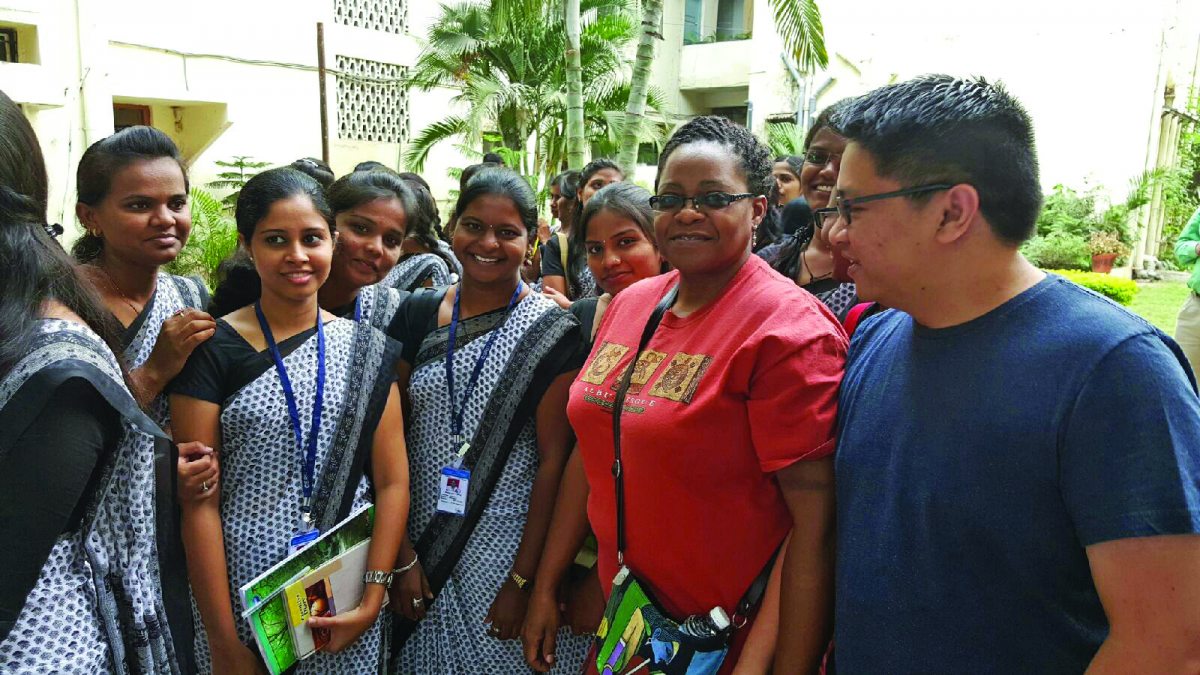Social work through a global lens
Carolina’s Global Social Development Innovations program is training social workers for global practice and bringing together an interdisciplinary team of researchers and scholars to improve the economic and social welfare of women, youth and their families around the world.

Gina Chowa, director of Carolina’s Global Social Development Innovations research center, is considered a pioneer in global intervention research, due to her groundbreaking work on the effects of asset ownership on youth and families in resource-limited countries. Her projects focus on developing holistic and impactful interventions that positively affect root causes of poverty and health disparities around the globe.
Chowa joined the faculty of UNC School of Social Work in 2008 and immediately focused on the social and economic development field, building a foundation for GSDI and launching the center in 2017. She planned for GSDI to serve dual purposes: to train social workers for global practice and to bring together an interdisciplinary team of researchers and scholars to produce evidence, develop interventions and impact policy to improve the economic and social welfare of women, youth and their families around the world.
“At the core, GSDI is about bringing social justice and bringing solutions to historically marginalized populations,” Chowa said.
Such a focus fits well within Carolina’s overall mission to be a leading global public research university, according to Ron Strauss, Carolina’s executive vice provost and chief international officer.
“What I love about the Global Social Development Innovations initiative is its embrace of some of the world’s most complex and challenging issues and [its ability to] bring the intelligence of the university and this community together to try to do something constructive, creative … in partnership with other entities to make a difference,” Strauss said.
Those partnerships are critical to GSDI’s goal of connecting scholars across Carolina’s campus and around the world to create sustainable social change. Global issues such as HIV/AIDS or the financial exclusion of women require complex solutions, Chowa explained, and researchers must be willing to collaborate with organizations on the ground and with experts from different disciplinary backgrounds.
“We can’t do this alone,” Chowa said. “If you go it alone, you might think you’re solving something, but you’re just scratching the surface. That’s why I always say the biggest impact is done in teams.”
GSDI’s team brings a wealth of global experience to the table, focusing on six core research areas: economic security, financial inclusion, social protection, workforce development, education and health. Assistant professors Rainier Masa, who serves as lead researcher for the center’s work on health and social protection, and David Ansong are GSDI team members, along with graduate student research assistants from SSW and nearly two dozen scholars affiliated with UNC-Chapel Hill and with other universities.
Many of those scholar-partners are in countries where GSDI projects are based. GSDI’s most recent projects have been in seven countries (China, Ghana, India, Kenya, Philippines, South Africa and Zambia), where team members have engaged leaders in government, business, non-governmental organizations and social development on initiatives that impact financial literacy, gender equity, access to education, food security and youth employment.
For example, in Ahmednagar, India, GSDI team members have worked closely with the Center for Studies in Rural Development (CSRD) at the Institute of Social Work and Research to reshape attitudes and behavior around young girls and women. Project partners have evaluated a training program designed to teach adolescent girls and boys about the importance of education, gender equity, reproductive health, leadership and gender-based violence prevention.
“The partnership with GSDI is very beneficial to our work … because GSDI faculty are bringing in scientific knowledge, innovative approaches and global perspectives to local problems,” said Suresh Pathare, CSRD’s director.
Collaboration and expertise flow both ways. GSDI is exploring how lessons learned from other countries around issues of youth unemployment, food insecurity and financial exclusion may shed light on social problems in our state, such as homelessness and poverty.
Whether the issues are in North Carolina or abroad, GSDI approaches these challenges with the same focus, Masa said.
“GSDI is unique in our approach to finding solutions, building knowledge and shaping policy,” he said. “We recognize the expertise of all stakeholders, particularly the vulnerable and marginalized populations that we work with.
“This multilevel expertise is so important as we tackle issues that have global social, health and economic implications.”
For Chowa, contributing to the next generation of scholars and practitioners is vital. She expects GSDI to play a significant role in preparing social workers for global practice and rigorous research work. As GSDI continues to grow, she hopes to bring in two doctoral students and four MSW students every two years to work with the center. This educational experience will likely include travel abroad so that students can learn in the field.
“We want students to see how we’re working in these communities so that they can learn as we’re learning,” Chowa said. “We also want them to help replicate this work when we’re long gone.
“I always say that a social worker is the best global social development practitioner because of our training,” she added. “You often have to deal with people holistically, because what is affecting their health might be an economic issue or a psychological issue.
“We try to touch all these aspects of somebody’s life or a community’s life. Social workers need to be leading the discussions.”
A longer version of this story originally appeared in Contact, the School of Social Work’s alumni magazine.




